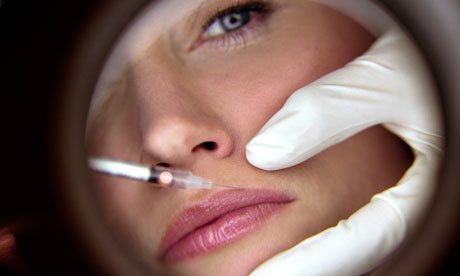
As the economic cuts bite, people are increasingly turning to the surgeon's knife to perk themselves up.
In the last 12 months, there were 38,274 operations – up from 36,482 the year before. The increase is sharpest among men, with 7% more males seeking the help of the scalpel, compared to 5% more women.
Britons spend about £2.3bn a year on cosmetic treatments, including Botox, chemical peels and laser treatments that smooth out wrinkles. Demand has risen 17% in the past two years and in 2009 Britons took out loans worth nearly £5m to pay for operations, with women aged over 45 the fastest growing group – up 10% in two years.
There was a 10% rise in boob jobs for women, from 8,537 to 9,418, according to figures collated by the British Association of Aesthetic Plastic Surgeons (BAAPS).
Men, who accounted for 10% of all cosmetic procedures in 2010, sought to reduce their décolleté in record numbers last year: the gynaecomastia operation to reduce the dreaded man-boob or moob, rose by a record 28% from 581 to 741. Facelifts are now second only in popularity among men to nose jobs (rhinoplasty) which at 993 is up 13.2%.
The pressure to look bright-eyed, if not bushy tailed, saw blepharoplasty (eyelid surgery) becoming the second-most popular surgery for men and women combined, up 6.3% to 5,779.
The only procedures to lose favour were tummy tucks (abdominoplasty), which were down 7.5% and the pinning back of prominent ears (otoplasty), down 17%.
"Every week there are reports in the press of new so-called 'lunchtime' procedures which are here today and gone tomorrow," said Rajiv Grover, consultant plastic surgeon and BAAPS president elect, with responsibility for the UK national audit of cosmetic surgery.
"But the growth rates for surgical facelifting, breast augmentation and rhinoplasty show double-digit percentage rises, because in times of financial hardship patients are looking for the real deal, for treatments which deliver a reliable, long-lasting result and have a proven safety record. The failure of injectable fillers to treat the breast and nose and for non-surgical methods to tighten loose skin of the jowls and neck has clearly fuelled a very significant rise in surgical treatment – despite the recession."
The global medical beauty market made £3.2bn last year – the same as 2008, a record. The breast implants market alone was worth £580m and is expected to grow at 7% a year until 2014.

